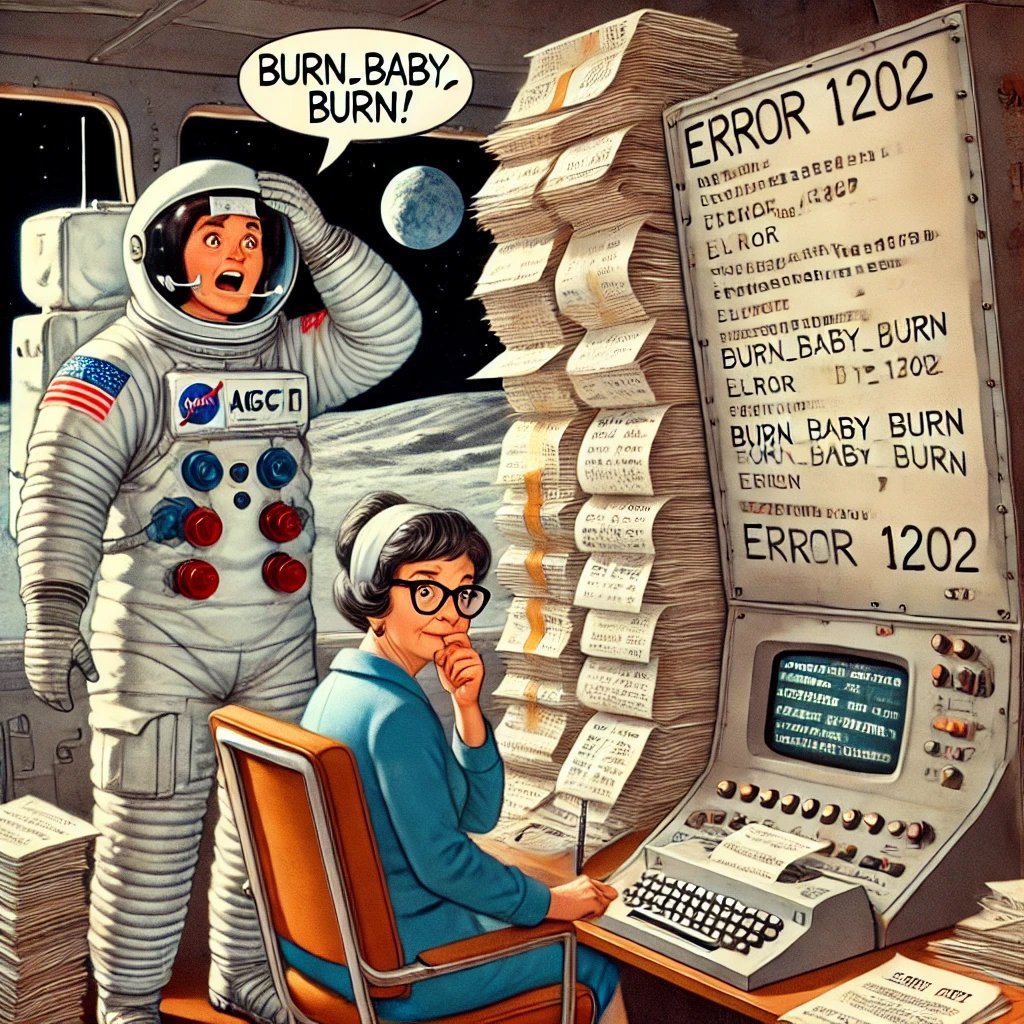
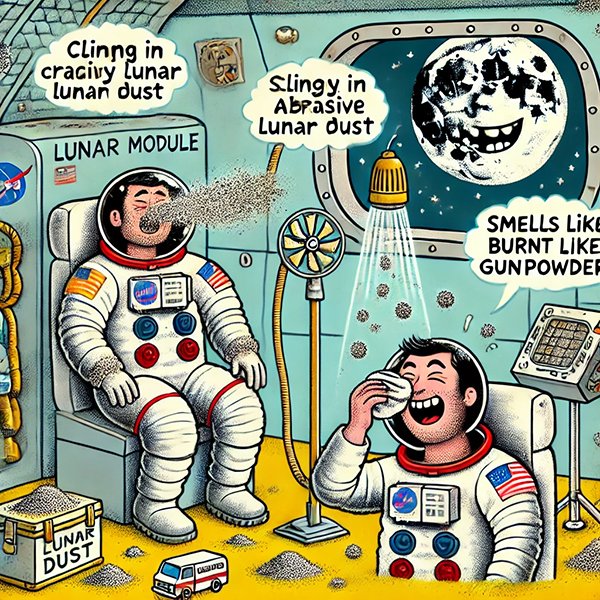
Moon dust
When Apollo astronauts set foot on the Moon, they brought back more than just rocks and glory—they also brought back lunar dust. And not the charming, romantic kind you’d imagine in a Coldplay song. Lunar dust was abrasive, clingy, and smelled like burnt gunpowder. It infiltrated every corner of the lunar module, caused allergic reactions, and gave NASA scientists a whole new nightmare to unravel. In this article, we’ll dive into the absurdly sticky problem of Moon dust, how it drove astronauts to the brink of madness, and why even now, NASA is still grappling with this clingy celestial glitter. Prepare for lunar sneezes, scientific head-scratching, and possibly the most inconvenient souvenir in space exploration history.

When Genghis Khan’s Grandson Got Schooled by Mother Nature: The Tale of the Mongol Invasions of Japan
The Mongol Empire was the medieval version of a rockstar world tour—unstoppable, heavily armored, and leaving a wake of conquered lands behind. Under Kublai Khan, grandson of the one and only Genghis Khan, the Mongols had an empire so vast you could ride a horse for months without leaving Mongol-controlled territory.
But across the East China Sea sat Japan, an unconquered island nation minding its own business, drinking tea, and writing poetry about cherry blossoms. For Kublai, Japan was the glittering jewel just out of reach—a stubborn sushi roll he couldn’t quite grab with his chopsticks.
So, in the year 1274, Kublai decided to do what Mongols did best: send a polite letter (read: “Surrender, or else”) and prepare a fleet big enough to blot out the horizon.
But little did he know that Japan wasn’t guarded just by samurai with cool swords—it was also guarded by divine meteorological intervention.

Jimmy Carter: The Peanut President Who Spent Four Years Losing Fights to Inflation, Oil, and Helicopters
Ah, Jimmy Carter—the president who walked straight out of a Hallmark movie about small-town honesty and directly into an HBO miniseries about economic chaos, diplomatic gridlock, and sweater-based energy policies.
Elected in 1976 on a platform of "I'm not Nixon!" Carter brought sincerity, Southern charm, and a sweater collection that could rival your grandmother's attic. But behind that warm smile and cardigan exterior lay a presidency marred by:
Economic misery
Diplomatic faceplants
A gas crisis that left America asking, "Is this the line for Star Wars tickets or just fuel?"
So, buckle up, history buffs and snark enthusiasts, as we relive the Greatest Hits of Carter’s most eyebrow-raising presidential misadventures.

The Matchstick Girls Strike of 1888: When Your Job Made Your Face Glow in the Dark
In the summer of 1888, a group of underpaid and overworked young women at the Bryant & May match factory in London decided they’d had enough. Working conditions were so abysmal that workers developed a horrifying condition called phossy jaw—a necrosis of the jaw caused by exposure to white phosphorus, where bones literally glowed in the dark before disintegrating. The factory, of course, insisted everything was perfectly fine. This paper explores the industrial, economic, and social conditions that led to the strike, the horrifying realities of phossy jaw, and how a group of young women—armed with nothing but righteous indignation and, presumably, a few glowing smiles—sparked a labor movement. Through academic insight and an appropriate dose of snark, we’ll unpack one of the most overlooked yet important moments in labor history.
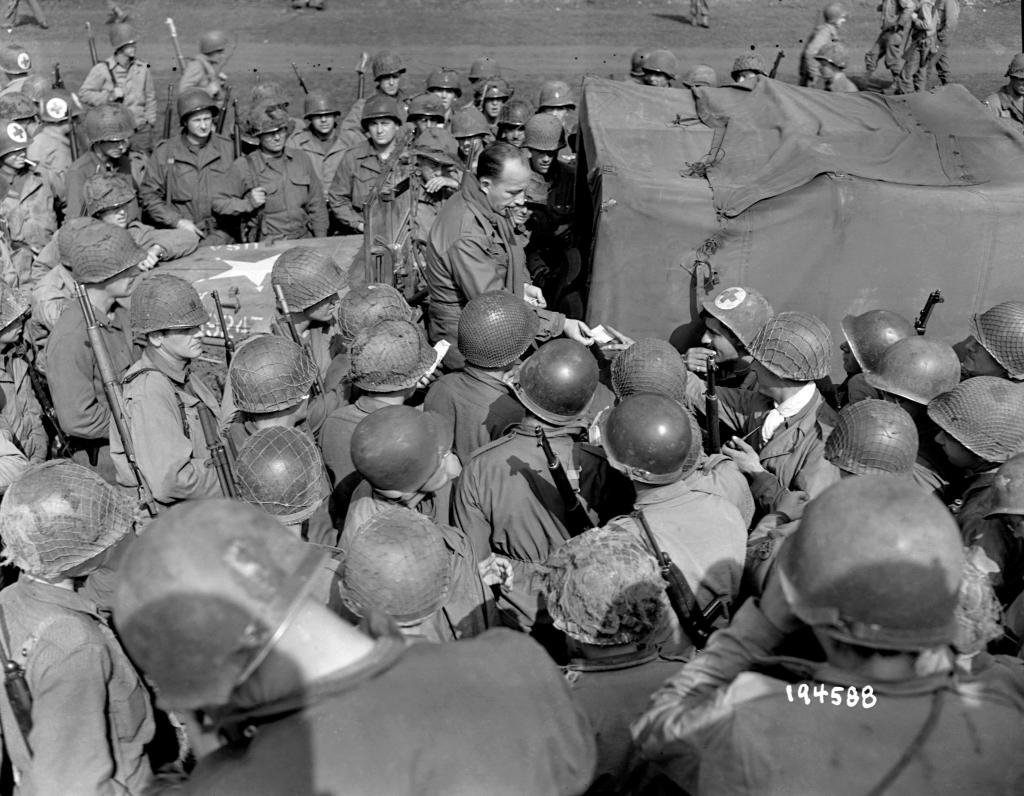
Bing Crosby’s Song in the Snow: How 'White Christmas' Brought Hope to Soldiers Before the Battle of the Bulge
Bing took the stage—or rather, a makeshift clearing among huddled men—and cracked a joke about how Miami would’ve been a more comfortable stop. The soldiers chuckled faintly, their faces a mix of exhaustion and fragile hope. Some hadn’t laughed in weeks. Others hadn’t spoken to anyone but the man next to them in the foxhole. But Bing’s voice carried something magical: familiarity, comfort, and a warmth that no fire could provide.
He took the microphone, cleared his throat, and said softly:
"It’s Christmas Eve, boys. And I know this isn’t home. But if you’ll let me, I’d like to bring a little piece of home to you."
And then he began to sing.
The opening notes of “White Christmas” floated into the night, mingling with the sound of distant artillery fire.
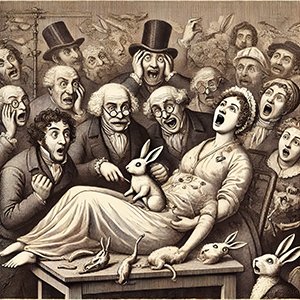
Mary Toft: The Woman Who Fooled 18th-Century Doctors by ‘Giving Birth’ to Rabbits”
In 1726, Mary Toft, an unassuming English woman, convinced some of the most esteemed medical minds of her day that she was giving birth to rabbits. Yes, rabbits. This bizarre and grotesque hoax unfolded in an era where science and superstition shared the same dinner table, and "trust me, I’m a doctor" carried a very different weight. What began as a small-town oddity escalated into an international scandal, making fools of King George I’s royal physicians and leaving the medical community red-faced (and likely checking underbeds for stray bunnies).

The World’s First Computer Virus: How a Bored Teenager Ruined Floppy Disks Forever
It was 1982. Ronald Reagan was president, people were still recovering from disco, and if you wanted to share data, you didn’t “airdrop” it—you handed someone a floppy disk. Computers were mysterious, clunky, and mostly harmless. Then along came Rich Skrenta, a 15-year-old prankster from Pittsburgh, who decided to ruin that peace of mind.
Rich wasn’t some evil genius bent on global domination. He was just a bored teenager with a computer and far too much time on his hands. What did he create?

The Time Britain Tried to Build an Aircraft Carrier Out of Ice: Inside Project Habakkuk, WWII’s Most Ambitious and Bizarre Military Experiment
Let’s set the stage: It’s World War II. The Nazis are dominating the Atlantic, German U-boats are turning supply ships into fish food, and the Allies are desperate for a solution. The answer? Build a warship—but not just any warship. Build one out of ice.
Yes, ice. Apparently, the stress of war had everyone losing their cool. This was Project Habakkuk, an idea so bizarre it makes the exploding whale incident seem reasonable. Spoiler alert: it didn’t work, but the attempt left behind one of the funniest and most ambitious chapters in military history.
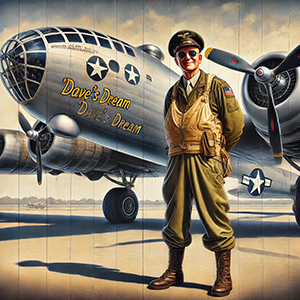
General Woodrow B. Swancutt and the Fourth Atomic Bomb: A Forgotten Chapter in Nuclear History
The story of General Woodrow B. Swancutt and the fourth atomic bomb ever dropped after World War II is a compelling yet overlooked narrative in the history of nuclear weapons. Swancutt’s role as the pilot who dropped the bomb during Operation Crossroads, his service in Korea and Vietnam, his rise to the rank of General, and his contributions to aviation after retirement offer a unique perspective on one of the most transformative periods in modern history. This article explores his early life, wartime service, pivotal role in Crossroads, post-war military contributions, and his post-retirement legacy.